Musk loves China, the factories in Shanghai, and the fans here, but of course his favorite thing is probably the Chinese employees.
Because they work hard, they rise to the occasion, and they're not afraid to work overtime.
Just recently Musk was talking in an interview about the Chinese and American differences in employees - Chinese employees are still working at 3am, while Americans don't even want to go to work. In fact, employees at the Tesla factory in Shanghai do work hard, with hundreds of Tesla employees living and eating at the factory to prevent the new crown virus from affecting the factory's production schedule and perfecting the closed-loop system.
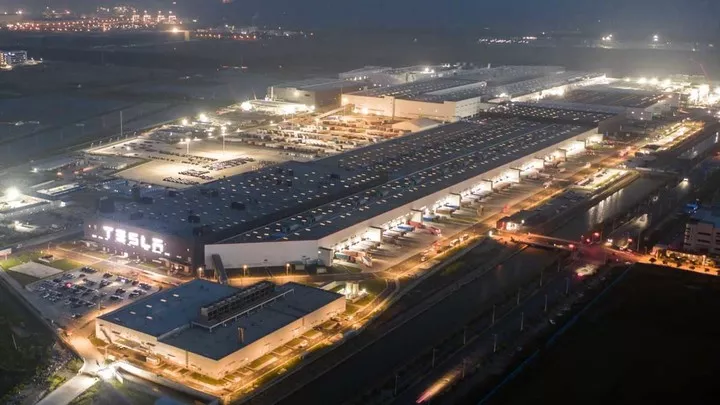
▲ Shanghai Tesla Factory
Of course, that's not the point. Musk wasn't mainly trying to compliment the Chinese employees either, but to say that the Chinese are working so hard, so why should you Americans even want to go back to the company.
So Musk waved a big hand, everybody, right now, get back to the office.
The richest man in the world lets you go back to work in his office
Musk told employees to stop telecommuting and come back to work and spend at least 40 hours a week at the company.
At a time when many company employees are starting to protest the 'RTO (Return To Office)' policy and long commutes, Musk is going the other way. On Wednesday morning, every employee at Tesla received an email from Musk detailing his demands for employees to return to the office.

▲ More companies are asking employees to return to the office . Image from: Washington Post
The email, titled "Very Clear", reads.
Anyone wishing to work remotely would have to work 40 hours a week in the office or leave Tesla.
The office must be where your colleagues are, not some remote 'pseudo-office'. If you don't show up, we'll assume you've resigned.
The higher the position, the more you should be present in the office ...... That's why I often live in the factory - those on the line can see me working with them. If I didn't do that, Tesla would have gone out of business long ago.
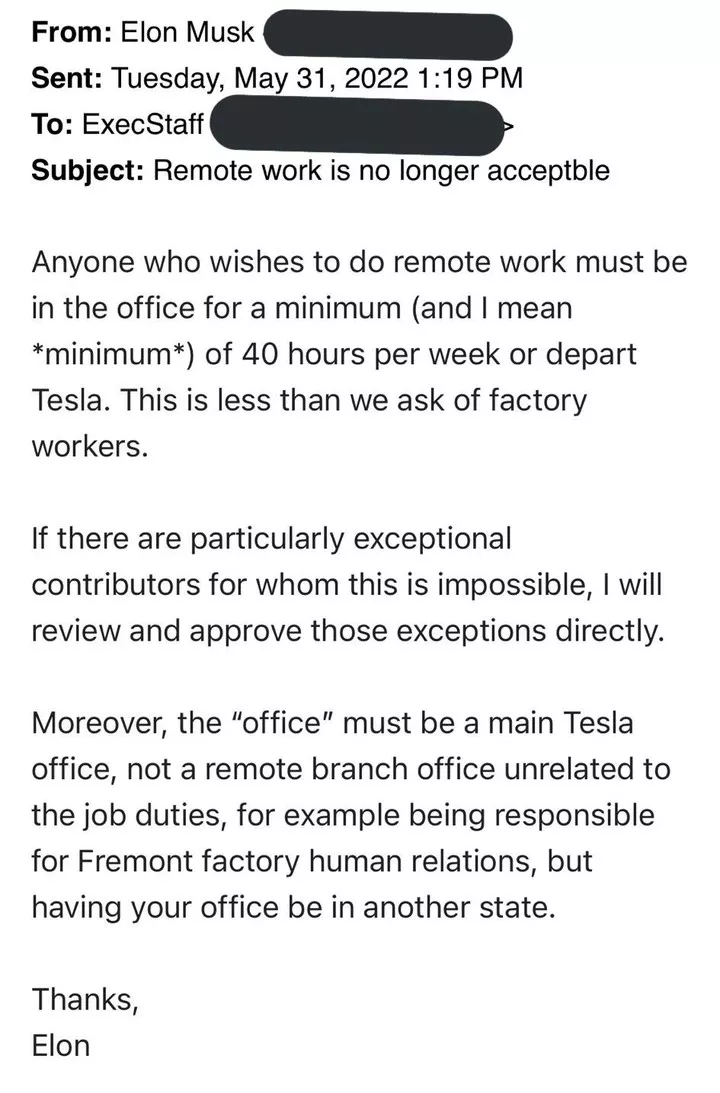
▲ Exposed Musk emails
Musk also thought of other big companies that employees might use as examples - they also have established businesses and high market caps, but they don't ask their employees to return to work. In response, Musk chose to respond directly in another email, "When was the last time these companies released a great new product? It's been a while."
I guess a lot of companies feel like they've taken a sword to the knee and might as well just give their name.
By contrast, Musk says they are making and have made some of the most exciting and meaningful products on the planet, but those things won't come over the phone. That's why it's so important to be in an office where you can communicate quickly.

▲ The office makes communication easier
But Musk has never been a big pro-people boss either, and he has always been very strict with his employees, many of whom even consider him harsh.
A tweet from Silicon Valley venture capitalist Keith Rabois gives a good indication of the world's richest man's management style - Musk caught a group of interns milling around in the coffee line when he was at Space, and he sternly banned the behavior, saying that if he ever saw them procrastinating on buying coffee again, he would fire them all. he would fire them all. Musk even installed security cameras to see if employees were 'groping' during work hours afterwards.

▲ Stern Boss Musk
At this point, no one thinks Musk was joking when he publicly started a poll on whether to turn Twitter offices into a shelter when he bought Twitter. The "there's no one there now anyway" line is a complete disservice to Twitter for allowing employees to telecommute.
As far as Musk is concerned, employees are working remotely, so why don't you just leave your office alone?
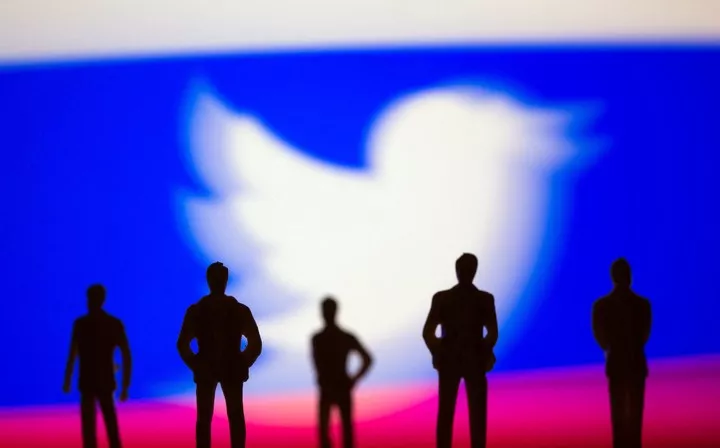
▲ Twitter is a company that allows flexible working
Alphabet, IBM all returning to the office
In fact, with employees wanting to work remotely today, it's not just Tesla that's bucking the trend, but also IBM, Alphabet and a host of other big companies.
IBM is probably the company that has changed the most out of all of this.
IBM has always been a model and predecessor of the telecommuting model, having tried it back in 1979 - when, in an attempt to relieve congestion on the mainframe at headquarters, IBM installed terminals in the homes of five employees, allowing them to work remotely.

▲ Telecommuting makes going to the office no longer the only option
But the pioneers are not the champions of this model, or will not always be the champions of this model.
IBM was once very proud of their telecommuting model, and in a 2009 report, IBM said that about 40 percent of their employees, out of a total of 386,000 employees in 173 countries worldwide, did not have any physical office space, which reduced their costs by nearly $2 billion.
But in 2017, IBM, which has no physical office space for 40% of its employees, reversed course and eliminated the remote working mechanism, allowing thousands of remote workers to return to physical offices again. IBM's move was controversial at the time, with some even accusing them of hidden layoffs, all to force employees to quit on their own.
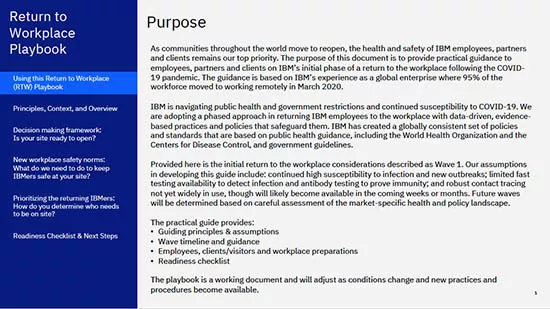
▲ IBM calls for employees to return to the office
But IBM is also considered a change from years ago, and to see recent changes you have to look at Google's parent company, Alphabet, whose changes are more indicative of a company's wrestling and wavering with telecommuting.
About 30 percent of Google Ireland's 7,000 employees worked remotely during the new crown epidemic. At the time, sources close to the situation revealed that Google internally thought that percentage was too high.
For his part, Alphabet CEO Sundar Pichai sent an email to employees in 2021, only this one made employees happier than Musk's, in which Pichai said they expect 20% of their employees to permanently telecommute, while they will begin a hybrid office model, with the rest of the time available for office choice, and employees can also request 4 weeks per year to work at any location for work.
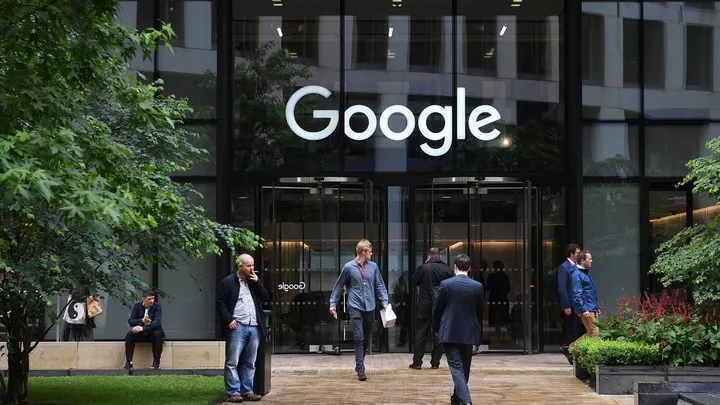
▲ Alphabet employees can also work flexibly
All in all, flexible and free, drawing a lot of applause from the outside world.
But in the meantime, Alphabet is offering employees a pay location calculator (Work Location Tool) that allows them to see how office location affects pay. According to the calculator, some telecommuters (especially those with long commutes) may experience a pay cut without changing their address.
The simple fact is that you would have liked to do a Tier 1 city job in a Tier 3 city so that the cost of living goes down and the salary is really well below the average for that location. But the company tells you no, even if you telecommute you have to live near the company, and to go to a third-tier city salary will be reduced by 25% oh. In this case, some people choose to quit, some choose to take a pay cut, and some choose to return to the office.
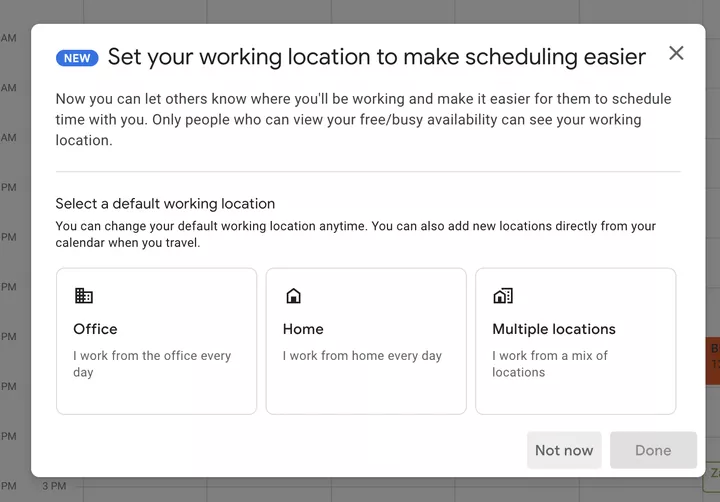
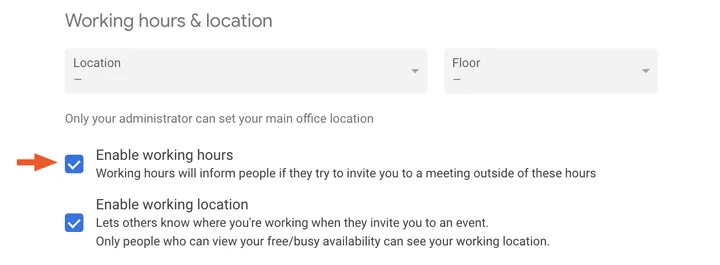
▲ Alphabet's Work Location Tool
If the pay location calculation process is still a euphemism for persuasion to return, this April's official request for users to return to the office is the official notice. alphabet has employees ready to go back to work to start a hybrid office model, working at least three days a week in the office.
There's another, more direct proof that Alphabet wants its employees to work in offices - buying land. It spent $1 billion on the 400,000-square-foot Central Saint Giles building in London; invested more than $7 billion to open a new U.S. office and expand its data center; and broke the record for the most expensive single office building sold, with plans to put office space into use by 2023.

▲ Alphabet's building
This is the best example of "straight talk", saying that you don't need to use it, but in fact you're on an office shopping spree.
Sundar Pichai is also actively stumping for his own policies, stating in an interview with the Wall Street Journal that
Most of our staff will be coming to the office three days a week. I think we can be more purposeful about scheduling their time so that group meetings, brainstorming, community building, and that type of work that requires collaboration and creativity gets done during that time frame.
So should I work from home or not?
In-house has had consistent telecommuting experience for the past 3 years, so was very vocal when it came to this issue. When the new Musk move was mentioned at the morning meeting, the editor-in-chief sent a 'soul question' to all - so do you prefer to come to the office or work from home.
Everyone looked at each other or decided to tell the truth, and that was of course ......

▲ Telecommuting so you can sit at home on the couch
"Of course I prefer to come to the office, don't I? It's only fun when you're with everyone!" Before we could even say the truth, our editor-in-chief had already said the answer for us. Okay, you're the editor-in-chief, you're in charge.
That's the paradox of telecommuting. Employees like the leisurely ease of telecommuting, where time can be deployed and work just needs to get done, whether you're lying down, sitting or lying on your back. And your boss may want to be more involved in your work sessions, to see how you work with others, to walk a few steps to ask you about the progress of a project, or even a meeting that can move forward at any time because you're right next to it.
The former argues that the value of work does not change because the location of work shifts, while the latter argues that the value of collaboration needs to rely on face-to-face interaction to be maximized.

▲ Telecommuting may also be disturbed by family members
So what exactly is the right answer?
Natacha Postel-Vinay, a historian of economics and finance at the London School of Economics and Political Science, says: "Most of the evidence suggests that efficiency increases when people are at home." And a large-scale survey of company employees in the US and UK, conducted by Almarina Gramozi, a lecturer in economics at King's College London, suggests that employees are no less efficient working from home than they are working in an office. However, she also points to similar studies in Japan, which show that Japanese employees are indeed less efficient when they work from home.
And employers who want their employees back in the office have more evidence to support the need to work together. In 1977, for example, MIT professor Thomas J. Allen found that the further apart the simultaneous desks were, the less likely they were to communicate. When two employees are more than 30 meters apart, the likelihood of them communicating regularly, let alone in different spaces, is close to zero.
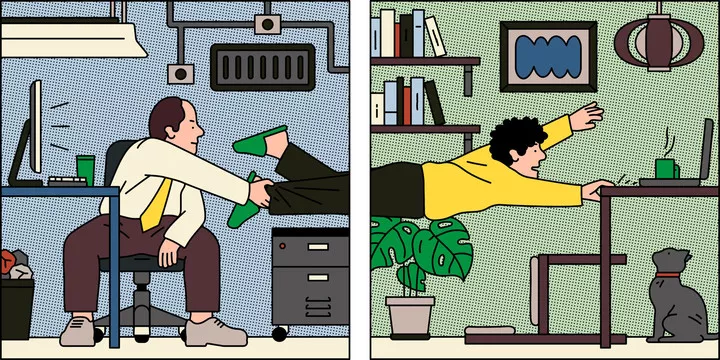
▲ The two office models pull at each other . Image from: New Yorker
You have the data to back it up, and I have the scientific theory. The perception of telecommuting is also completely different for different people and industries; positions that require collaboration with people will be better suited for sitting in, while some positions that rely more on specialized skills will be better suited for telecommuting. To be more nuanced, whether you're a self-disciplined person and what kind of boss you have will also affect how effective you are at telecommuting.
Everyone has their own beliefs when it comes to this telecommuting thing and they have made their own choices.

▲ Machine learning bull who left unhappy with Apple's return-to-work policy
It was Ian Goodfellow, Apple's former director of machine learning, who chose to leave because he was unhappy with Apple's strict return-to-work policy, writing in a note to his subordinates "I insist that flexible working is the best policy for my team."
And Musk gave a simple, straightforward one-size-fits-all option because of disgruntled employees who wouldn't go back to work in the office: 'Either walk away or work eight hours a day at the company.'